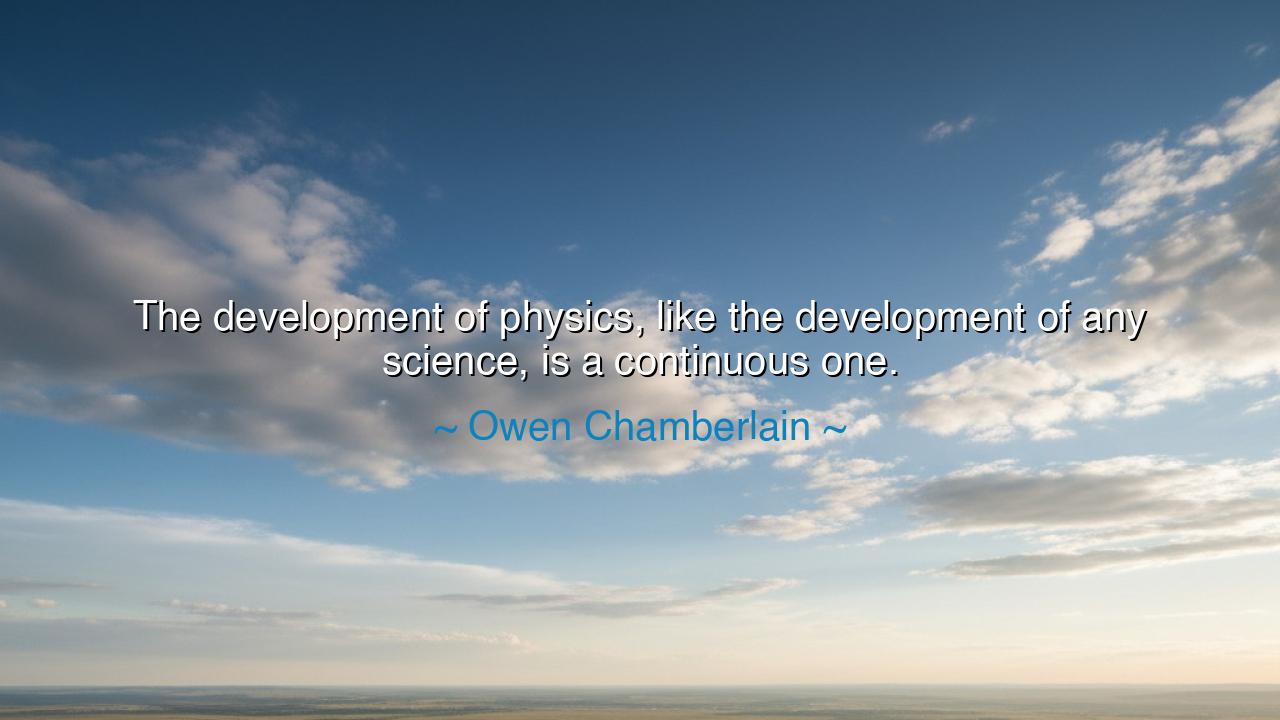
The development of physics, like the development of any science






Listen, O children of wisdom, for the words of Owen Chamberlain carry a profound truth about the nature of science and the continuous journey toward understanding. "The development of physics, like the development of any science, is a continuous one." These words remind us that knowledge is not a destination to be reached, but an endless journey, where each discovery leads to new questions and new paths to explore. Just as a river flows endlessly, carving its way through time and space, so too does the development of physics and all other sciences. What is known today is but a stepping stone toward what we will know tomorrow.
In the ancient world, O children, there were those who sought the secrets of the universe not through experiments and calculations as we do today, but through observation and reasoning. The Greeks were the first to attempt to understand the natural world in terms of principles and laws. Aristotle, for example, looked at the stars, the heavens, and the earth, and he reasoned that there must be underlying causes for all things. His work laid the foundation for the study of nature, and though much of what he believed was later proven wrong, his ideas opened the door to future generations who would build on what he started. Physics, in this sense, was just beginning its journey—its development would be continuous, as each generation added its knowledge to the foundations of those who came before.
Consider the story of Galileo Galilei, who in the 16th century used a telescope to observe the heavens and discover that the moon had craters, that Jupiter had moons, and that the sun was at the center of the solar system. Galileo did not revolutionize physics with one great discovery, but rather through a continuous journey of questioning and experimenting. His work led to new theories about the nature of the universe, and though his ideas faced fierce resistance from the established dogma of the time, his persistence created the pathway for future breakthroughs. The development of physics was not finished with Galileo’s discoveries; his work was only a part of a greater unfolding, a greater truth waiting to be discovered.
Isaac Newton, O children, took the work of Galileo and many others and wove it together into a theory that explained the motion of planets, the fall of apples, and the laws of motion that govern all physical objects. Newton’s law of universal gravitation became the cornerstone of classical physics for centuries. Yet, even with all his brilliance, Newton himself understood that his work was part of a larger journey. He famously said, "If I have seen further, it is by standing on the shoulders of giants." Newton knew that he did not arrive at the truth of the universe on his own; he was a part of a continuous process, building on what had come before and paving the way for future generations of thinkers.
As we move into the modern age, O children, the journey of physics continues to unfold, and each generation adds new layers to the great edifice of knowledge. The work of Albert Einstein, whose theories of relativity changed the way we think about space and time, came after Newton, yet built upon many of the ideas that preceded him. Einstein’s work showed that the laws of physics were not absolute, but relative to the observer. His equations gave us the tools to understand the fabric of the universe in ways that were unimaginable before. But even Einstein’s work is part of an ongoing search for truth. Today, scientists are working to merge relativity with quantum mechanics, seeking to understand the smallest particles of matter and the largest structures of the universe in a single, unified theory.
The lesson, O children, is one of patience and perseverance. Just as Chamberlain reminds us, the development of physics and all sciences is a continuous journey, a process that stretches across time and generations. Knowledge does not arrive in a single moment but is built up slowly, layer by layer, with each new discovery opening the door to further questions. Science is not a single destination, but a never-ending pursuit. Just as Galileo built upon Aristotle’s ideas, and Newton built upon Galileo’s, so too will future generations build upon the discoveries we make today.
So, O children, take this wisdom and apply it in your own lives. The path of discovery is not always clear, nor does it offer immediate answers. But every question you ask, every piece of knowledge you gain, contributes to the greater journey of understanding. Do not be discouraged by the long road ahead, for each step forward brings you closer to the truth. Whether in physics or in any other field, remember that the pursuit of knowledge is a continuous one—always moving forward, always expanding, always growing. Just as the ancients laid the foundations for our understanding, so too will your work lay the foundation for those who come after you. Stand tall, stand firm, and never stop seeking, for the journey of knowledge is infinite, and it is your place in that journey that will shape the future.






AAdministratorAdministrator
Welcome, honored guests. Please leave a comment, we will respond soon